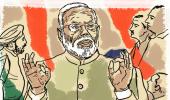Many political experts believe that the extent of protests has put the government on the defensive and highlighted its unpreparedness.

With the Bharatiya Janata Party's allies distancing themselves from it over the fallout of amendments in the citizenship law and turning against the proposed National Regional of Citizens, the party finds itself increasingly isolated over these contentious issues but its leaders believe that any revision in its stand on the twin planks is unlikely.
However, almost all non-BJP chief ministers, barring those in Tamil Nadu, Andhra Pradesh and some in northeast, have come out against the proposed creation of a National Register of Citizens, making the idea a non-starter as of now.
A senior BJP leader said the NRC remains high on the party's agenda and pointed out that its working president J P Nadda had, as recently as on Thursday, reiterated its commitment to the proposal.
Asked about the viability of a nationwide NRC when so many states rejected it, he noted that the Modi government had been able to implement many key aspects of the saffron agenda which were hanging for decades and faced a lot of opposition.
The government will certainly come out with its details once things cools down, he said.
Union minister Nirmala Sitharaman, who has been articulating the position of the government and the party on the two issues, has said the ruling dispensation will consult stakeholders before starting the NRC drive.
Many political experts believe that the extent of protests has put the government on the defensive and highlighted its unpreparedness.
Sushila Ramaswamy, an associate professor of political science in the Jesus and Mary College, noted the government's assertion that its measures are not against any Indian and said that this message has not gone across to most people.
"There is so much of apprehension and fear. The government has not been able to explain. They should have prepared the people instead of hurrying into it. They should have clearly stated what will be needed to to prove one's citizenship if at all it (NRC) comes up. Right now, there is so much of ambiguity which has added to people's worries," she said.
A strong view within the BJP is that the party will politically gain from the amended citizenship law and the NRC as the former underlines its commitment to the Hindu refugees and the proposed registration of citizens is in line with its agenda of identifying illegal infiltrators.
The NRC is a critical issue for the party in Assam and West Bengal, two eastern states where it has emerged as a strong political force riding on its Hindutva plank.
Ramaswamy, however, added that the central government must prepare the country and take people with different opinions on board, before making its next move.
A government represents all sections of society and it should not resort to "identity politics" over such a sensitive issue as this is creating "unnecessary fissures" in society, she said.
"The government should be cautious till it gets diverse people on board. The government should be more respectful of diverse opinions even if they are to the contrary to what the ruling dispensation believes in," she said.
If Prime Minister Narendra Modi, who has been attacking opposition parties over the matter of amended citizenship law, touches on the NRC issue in his rally in the national capital on Sunday, then his remarks will set the tone in the party.
BJP ally and Bihar chief minister Nitish Kumar had on Friday come out against the NRC and Odisha chief minister Naveen Patnaik whose party the Biju Janata Dal often backed the BJP, had taken a similar stand a few days back.
Most chief ministers from the opposition camp have already made it clear that they will not allow the exercise in their state.
The opposition has argued that the NRC in combination with the amended citizenship law is discriminatory against Indian Muslims, a charge rejected by the central government.











 © 2025
© 2025